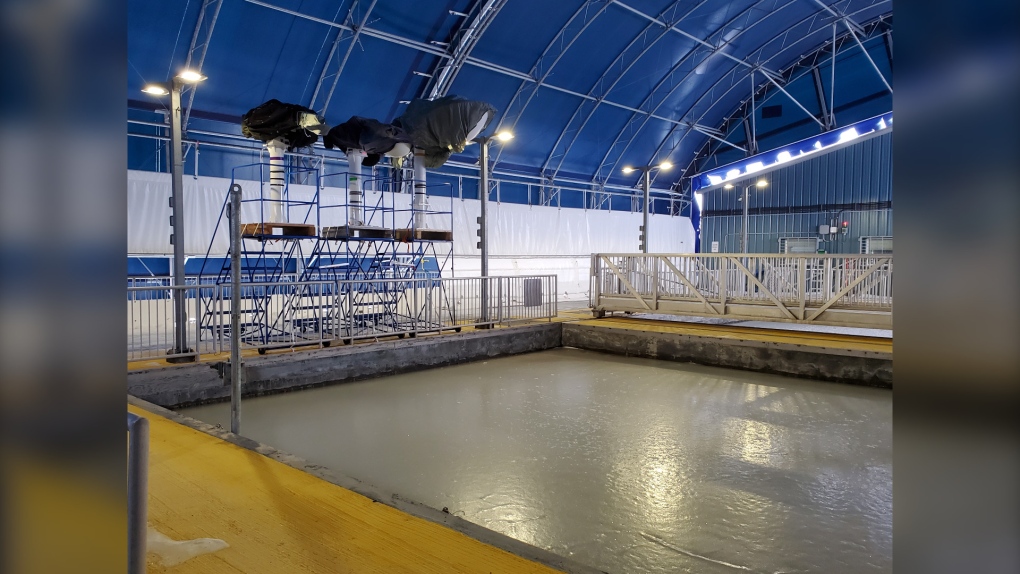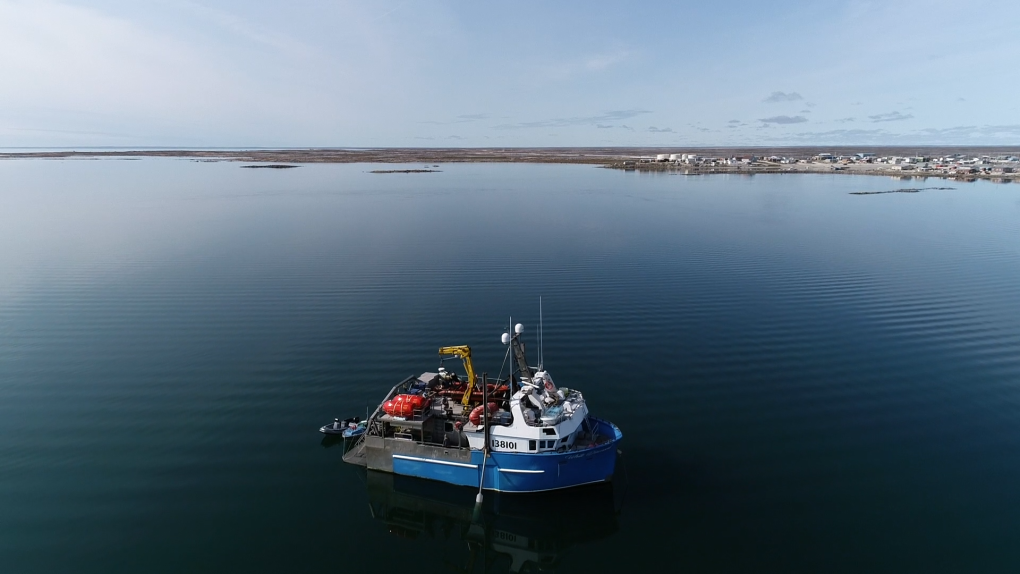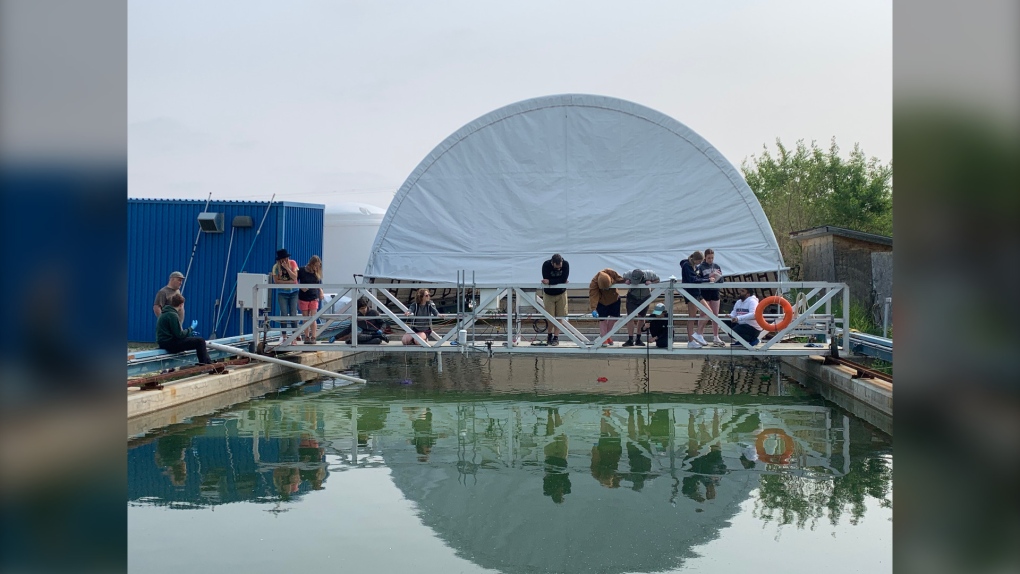Manitoba's first marine research facility opens in Churchill
The province's first marine research facility has officially opened its doors in Churchill, ushering in a new era of research innovation in Manitoba.
The University of Manitoba held the grand opening of the Churchill Marine Observatory (CMO) Tuesday, with municipal, provincial, federal and community leaders on hand to mark the occasion.
Touted as a globally unique major research facility, it is dedicated to studying the challenges and opportunities of a rapidly changing Hudson Bay and Arctic Ocean.
"This is one of the biggest days in the research history of Manitoba," Feiyue Wang, professor and the observatory's project lead, told CTV Morning Live Winnipeg in an interview.
According to the University of Manitoba, the facility's location next to Canada's only Arctic deep-water port will give researchers access to marine and Arctic life like never before.
CMO is made up of several labs and facilities. Its Ocean-Sea Ice Mesocosm Facility consists of two outdoor pools designed to simultaneously accommodate contaminated and controlled experiments on different scenarios for marine and freshwater environments.
 The observatory's Ocean-Sea Ice Mesocosm Facility is shown in an undated image. (University of Manitoba)
The observatory's Ocean-Sea Ice Mesocosm Facility is shown in an undated image. (University of Manitoba)
The Environmental Observing System monitors the main shipping land to and from the Port of Churchill. It will help gather data in a push to increase baseline knowledge of general oceanography.
Topping it off is Research Vessel (RV) William Kennedy, Canada's first research vessel dedicated exclusively to the 'typically understudied region' of Hudson Bay.
Tantamount to the facility's mission, Wang said, is not only studying the effects of climate change on the region, but the opportunities it presents.
 Research Vessel (RV) William Kennedy is shown in an undated image taken via drone off the coast of Churchill, Man. (University of Manitoba)
Research Vessel (RV) William Kennedy is shown in an undated image taken via drone off the coast of Churchill, Man. (University of Manitoba)
For example, the Port of Churchill, which is Canada's only Arctic seaport serviced by rail, typically has an operational season of three months or so due to weather conditions.
"With the dramatically changing sea ice conditions throughout Hudson Bay, the prospect is there that shipping season could be significantly extended to at least half a year and in the foreseeable future, could be all year round," he said.
"Along with that, there are many, many exciting opportunities but there also challenges and concerns."
Wang says the observatory allows them to study those risks and develop the tools and technology to mitigate them.
University of Manitoba President and Vice-Chancellor Dr. Michael Benarroch says the post-secondary institution has been building partnerships with Inuit and First Nations communities and organizations in the Arctic as it developed the facility.
"We have been asking how we can ensure our work brings truly positive benefits to northern communities through responsible economic developments and environmental protections," he said in a news release.
"Now, the Churchill Marine Observatory will provide answers to these and many other questions."
The facility was funded by a combined investment of $45 million from the Canada Foundation for Innovation, the Manitoba and Alberta provincial governments, and several federal and private partners.
It is also available for outside booking by organizations conducting Arctic research.
- With files from CTV's Rachel Lagacé
 The Churchill Marine Observatory is shown in an undated image. (University of Manitoba)
The Churchill Marine Observatory is shown in an undated image. (University of Manitoba)
CTVNews.ca Top Stories

'Mayday! Mayday! Mayday!': Details emerge in Boeing 737 incident at Montreal airport
New details suggest that there were communication issues between the pilots of a charter flight and the control tower at Montreal's Mirabel airport when a Boeing 737 made an emergency landing on Wednesday.
Trudeau appears unwilling to expand proposed rebate, despite pressure to include seniors
Prime Minister Justin Trudeau does not appear willing to budge on his plan to send a $250 rebate to 'hardworking Canadians,' despite pressure from the opposition to give the money to seniors and people who are not able to work.
Hit man offered $100,000 to kill Montreal crime reporter covering his trial
Political leaders and press freedom groups on Friday were left shell-shocked after Montreal news outlet La Presse revealed that a hit man had offered $100,000 to have one of its crime reporters assassinated.
Cucumbers sold in Ontario, other provinces recalled over possible salmonella contamination
A U.S. company is recalling cucumbers sold in Ontario and other Canadian provinces due to possible salmonella contamination.
Trudeau says no question incoming U.S. president Trump is serious on tariff threat
Prime Minister Justin Trudeau says incoming U.S. president Donald Trump's threats on tariffs should be taken seriously.
In a shock offensive, insurgents breach Syria's largest city for the first time since 2016
Insurgents breached Syria's largest city Friday and clashed with government forces for the first time since 2016, according to a war monitor and fighters, in a surprise attack that sent residents fleeing and added fresh uncertainty to a region reeling from multiple wars.
Canada Bread owner sues Maple Leaf over alleged bread price-fixing
Canada Bread owner Grupo Bimbo is suing Maple Leaf Foods for more than $2 billion, saying it lied about the company's involvement in an alleged bread price-fixing conspiracy.
Musk joins Trump and family for Thanksgiving at Mar-a-Lago
Elon Musk had a seat at the family table for Thanksgiving dinner at Mar-a-Lago, joining President-elect Donald Trump, Melania Trump and their 18-year-old son.
Here's how thick ice needs to be to park a truck on it, according to Sask. Water Security Agency
The Saskatchewan Water Security Agency (WSA) says ice should be at least one foot (30 centimetres) thick before it's safe to drive a car or light truck on a frozen body of water.


































